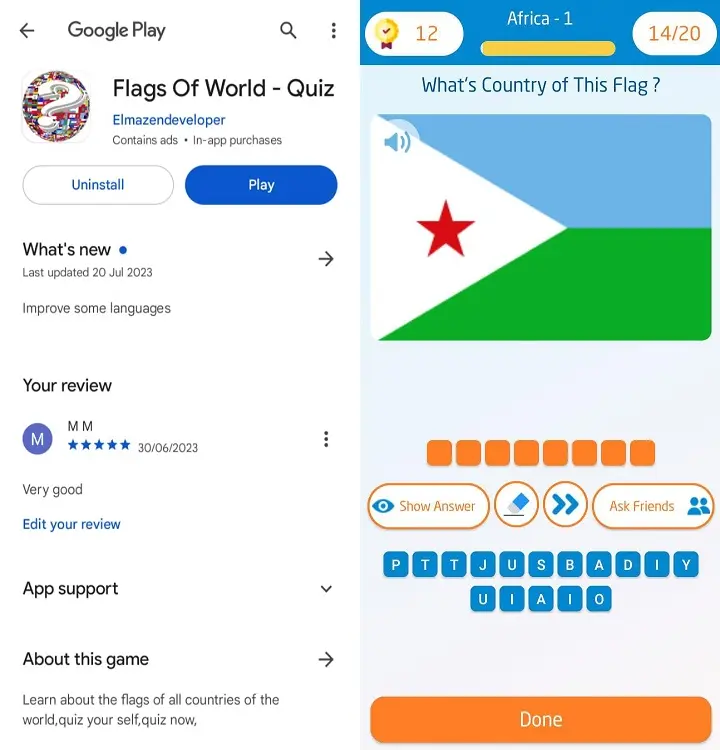Flag of Djibouti, Currency, Population, Tourist Places
Djibouti: A Hidden Gem in the Horn of Africa
Discover Djibouti: Borders, History, Capital, Tourist Attractions, Flag, Currency, Population
Borders of Djibouti:
Djibouti, a small country located in the Horn of Africa, holds a strategically significant position, bordered by Ethiopia to the west and south, Eritrea to the north, and Somalia to the southeast.
It also has a coastline along the Red Sea and the Gulf of Aden.
Despite its small size, Djibouti boasts a remarkable natural and cultural diversity, making it a unique destination for adventurers and explorers.
History and Culture of Djibouti
Djibouti was once a French colony and gained independence in 1977.
Since then, it has become a vital commercial and strategic hub due to its location at the entrance of the Suez Canal, one of the busiest waterways in the world.
Djibouti is a melting pot of cultures, with influences from African, Arab, and French heritage.
The country's population is primarily composed of two major ethnic groups: the Somalis and the Afar, each with its own distinct traditions and customs.
French and Arabic are the official languages, while Somali and Afar are widely spoken.
Flag of Djibouti, Currency, Population, Tourist Places

Download the application  Flags Of World - Quiz ,
Flags Of World - Quiz ,
And test your knowledge with Flags of World ,
Djibouti City: The Capital
Djibouti City, the capital bearing the same name as the country, serves as its vibrant heart and main port.
It is a lively and bustling metropolis where visitors can explore traditional markets filled with handicrafts and local products.
The city also offers a rich culinary experience that reflects a blend of African, Arab, and French flavors.
Tourist Attractions in Djibouti
Despite its small size, Djibouti offers diverse landscapes, including deserts, mountains, salt lakes, volcanoes, valleys, and plateaus.
Some of the must-visit attractions include:
Lake Assal:
- The lowest point in Africa and the third-lowest in the world, sitting 155 meters below sea level.
- This highly saline lake holds one of the world's largest salt reserves and is a major tourist attraction due to its unique beauty.
Tadjourah:
- One of the oldest towns on the east coast of Africa, overlooking the Gulf of Tadjourah.
- This historic city is known for its serene atmosphere and a mix of African and Arab culture, reflected in its traditional architecture and local cuisine.
Day Forest National Park:
- Located in the mountainous region, this park is home to a variety of plants and wildlife, including the rare Djibouti francolin bird, which cannot be found anywhere else in the world.
Moucha Island:
- A small island off the coast of Djibouti, perfect for day trips.
- Visitors can relax on its soft sandy beaches, swim in its turquoise waters, and even spot dolphins on their way to the island.
Flag of Djibouti, Currency, Population, Tourist Places

Download the application  Flags Of World - Quiz ,
Flags Of World - Quiz ,
And test your knowledge with Flags of World ,
The Flag of Djibouti
Djibouti’s flag symbolizes its history and cultural identity.
It consists of two horizontal stripes in light blue and green, with a white triangle containing a red five-pointed star.
Each color has its own significance:
- Blue: Represents the sky and sea and symbolizes the Somali people, the country's majority ethnic group.
- Green: Represents the land and nature and symbolizes the Afar ethnic group.
- White: Stands for peace and purity.
- Red Star: Symbolizes national unity and the sacrifices made for independence.
The Official Currency of Djibouti
Djibouti uses the Djiboutian Franc (DJF) as its official currency, which has been pegged to the US dollar since 1973, exchange rate of approximately 177.72 DJF per US dollar as of 1 February 2025.
The currency dates back to 1949 when it replaced the French Franc.
Djiboutian coins come in various denominations, including 1, 2, 5, 10, 20, 50, 100, 250, and 500 francs, while banknotes are available in 1,000, 2,000, 5,000, and 10,000 franc denominations.
Djibouti’s Population
As of February 2025, Djibouti has an estimated population of approximately 1.17 million people.
The majority of the population resides in the capital, while the rest live in rural areas or lead a nomadic lifestyle.
Islam is the predominant religion, with a small Christian minority.
Djibouti: A Promising Tourist Destination
Despite its small size, Djibouti has immense tourism potential, offering breathtaking landscapes, rich history, and diverse cultures.
It is an ideal destination for those seeking unique experiences away from mainstream tourist spots.
Visitors can enjoy diving with whale sharks, exploring volcanic terrain, and relaxing on pristine islands.
In summary, Djibouti is not just a small country in the Horn of Africa but a hidden gem with all the elements that make it an exciting destination for explorers and adventure seekers.
A visit to Djibouti is sure to be an unforgettable experience.